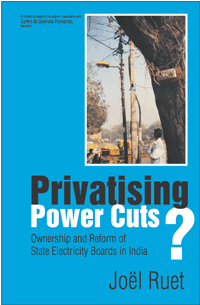 A4
A4

Hard-cover
•
2005
Pages: 339
ISBN: 8171884164
INR 1295

Beyond ideologies, beyond hiccups and cycles of reforms, privatisation of State Electricity Boards of India (SEBs), just alike their public reform, are structurally stalled. The book argues, the emphasis on ownership is misleading, and needs being articulated more subtly to a look at organisational structure of SEBs.
An in-depth enquiry in SEBs shows how privatisation is a one-sided game that has no real takers as long as SEBs remain organisations in which all technical, accounting, financial parameters are at the least hazy, often unknown. No investors will come without guarantees, thus the public has impression that SEBs are 'privatised for a song', while the economists feels they are virtually value less... while in practice awaited investors do not even turn up.
The book pinpoints, as the core of the stalemate, to the misconception in the very concepts generally used to analyse the internal organisation, the functioning, and the nature of SEBs. SEBs have now to undergo a specific and structural series of organisational changes, that the author calls 'enterprisation'. Privatisation is far from being the only tool for achieving this, among a wide set of public-private partnerships.
The matter is of importance, for not all States and afford, the way Delhi did, paying for endlessly re-negotiable financial gurantees.
“Joël Ruet is an insider. An excellent economist, as well as an engineer, his investigation inside SEBs is remarkable. Using the theories developed by James March, as well as property rights theory, he establishes the profound difference between an administration and an enterprise. SEBs being administrations, they cannot be 'privatised'. An intermediary step, 'enterprisation', is necessary. The richness and novelty of this analysis allow extending to other public organisations in service sector, as well as other countries where the reform of the productive functions of the State is the agenda of the day.”
— Pierre-Noël Giraud,
Professor, Ecole des mines, Paris
Member of the French Academy of Technology
“The question of how to reform India's loss making State Electricity Boards has vexed economists for years. Joël Ruet provides a fresh and detailed analysis...
— Michael Pollitt
Co -leader, Cambridge-MIT InstituteDirector of Studies in
Management and Economics, Sidney Sussex
College, University of Cambridge
“Dr. Ruet is the only person I know who has established through his studies of their operations, that SEBs in India have an administrative culture. Dr. Ruet has studied SEBs intensively and has ample evidence to make the comments he does. The book provides graphic descriptions of the internal decision-making processes in SEBs. It is a pity that management academics have not done this kind of study earlier because it throws up the basic reason for the decline of the SEBs. This is a book that must be read by SEBs, Regulators and government officials.”
— S.L. Rao
Chairman, ISEC, Bangalore,
formerly: Director General, NCAER , and Chairman,
Central Electricity Regulatory Commission.
“Dr. Ruet's book should be essential reading for all those concerned at the apparent failure of the World Bank's recommendations to reform the electricity supply industry in many developing countries, India providing an excellent example.”
— David M. Newbery
Director, Department of Applied Economics
University of Cambridge UK
“This book provides indepth enquiry and very useful insights into the problems of reforms of the State Electricity Boards in India.”
— Ramprasad Sengupta
Dean, School of Social Sciences
Jawaharlal Nehru University, New Delhi
Dr. Joël Ruet, alumni from Ecole des Mines, Paris, is Fellow at the London School of Economics and teaches in Jawaharlal Nehru University, New Delhi.
He has been the Head of Economist and Director of Centre de Sciences Humaines, New Delhi.
He has specialised in the study of economics reforms of the infrastructure and urban sectors in India, on which he has published extensively in academic journals, edited volumes, as well as books he has coordinated.
He sits in several Indo-French bilateral committees, and has been consulted on reforms by several Government of India committees and electricity regulatory commissions of State governments in India.
He has contributed or coordinated several research reports to the French Government.
He currently is the co-ordinator of two Indo-European research networks, on integrated management of water and urban governance in Indian cities.